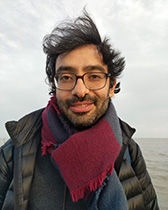Hamed Yousefi

Hamed Yousefi (he/him/his)
I study modern and contemporary art, focusing on practices that decenter the Western canon. My dissertation, titled “How Modern Art Became Islamic: Images of God and Man Between Iran’s Two Revolutions (1905–1979),” investigates the understudied role that Sufism and Islamic philosophical and literary traditions played in transformations of modern art. I argue that artists not only took inspiration from Islamic heritage, but that interactions between art and religion also led to new and reformed conceptions of Islam. The art that emerged in this process disrupts art history’s disciplinary periodization of Islamic vs. modern art and the assumption of secularity in studies of modernism.
My writings have appeared in English and Persian, in publications such as October, e-flux, Regards, and Herfeh: Honarmand and in exhibition catalogues by The Metropolitan Museum of Art, Grey Art Gallery (NYU), and MAXXI (Rome). My chapter titled “Between Illusion and Aspiration: Morteza Avini's Cinema and Theory of Global Revolution” appears in Global 1979: Geographies and Histories of the Iranian Revolution (Cambridge University Press, 2021). Most recently I published “The Race for Appropriation: Blackness, Authorship, and Ligon on Mapplethorpe” (October 183, Winter 2023).
Before my PhD, I worked as a filmmaker and directed numerous documentaries including a series of essay-films on “The Aesthetic History of the Islamic Republic in Iran (1979–2009)”, and a feature-length documentary called “The Fabulous Life and Thought of Ahmad Fardid” about the intellectual and political legacy of Ahmad Fardid (1910–1994), an Islamic Heideggerian philosopher.
I hold an MA in Aesthetics and Art Theory (Center for Research in Modern European Philosophy, London) and an MA in Cultural Studies (Allameh Tabatabai University, Tehran).
